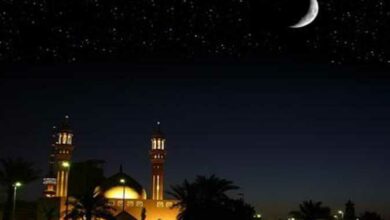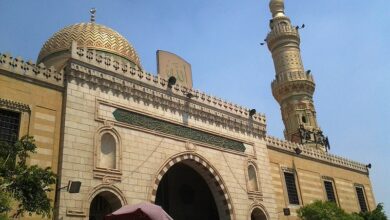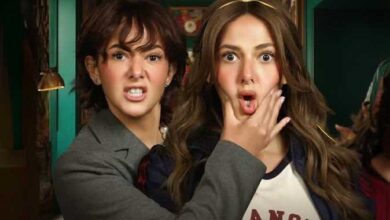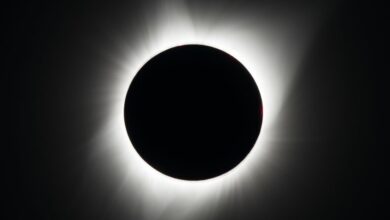This Ramadan season, actor, filmmaker, producer and rapper Ahmed Mekky presents “Al-Kabeer: Part 2” (The Great One: Part 2). The comedy series that was first aired in 2010 plays on the extreme cultural differences between two brothers; Johnny is raised in the US, while Al-Kabeer -whose real name is never mentioned in the show – is the mayor of a fictitious Egyptian village, called Al-Mazarittah.
In an interview with Al-Masry Al-Youm, Mekky discusses the scriptwriting, making and casting of the show, which is gaining popularity in Egypt.
Al-Masry Al-Youm: Last Ramadan, you presented only 15 episodes of your show because of the injury you suffered, but you got a daily spot throughout the whole month of Ramadan this year. So why are you only presenting 15 episodes this year and repeating them during the second half of the month?
Ahmed Mekky: I didn’t have enough time, as I was busy recording my new rap album, which will be out on the market next January. I am also working on a number of films. The TV show takes a lot of time and work and I don’t want to compromise its quality. If I were to make 30 episodes, it would never catch the Ramadan season.
Al-Masry: Given the success of parts 1 and 2, do you feel encouraged to shoot a third part?
Mekky: No, two parts are more than enough, I believe. If I were to work on more TV shows, they’d be very different from “Al-Kabeer”.
Al-Masry: Despite your success in cinema and TV, some believe that your roles are limited to specific characters; does that concern you?
Mekky: I don’t see my roles as similar. In fact, if that were true, I think it would harm me as an actor as one should be able to perform different characters. Some people think that I simply appear with my real character – that wouldn’t be acting, it would be mimicking.
Al-Masry: When we hear some of your punch lines in the series, we feel that you are the one who wrote them. To what extent do you interfere with scriptwriting?
Mekky: I like to think of scriptwriting as a collaborative process. I believe that no matter how much of a genius someone is, he will not be better than 10 people working together. So, we keep writing and making changes until we agree on the best punch line, which has to be approved by the show’s director, who is fully responsible for the work on the artistic level.
Al-Masry: It has been said that you had to reshoot several scenes last year, why?
Mekky: Some of our characters got fatter, others lost much weight, some withdrew from the series, and some newcomers joined us. So we had to reshoot some scenes to cope with those developments. This increased our production costs, but I was determined to present the show in the best possible way.
Al-Masry: We heard that you tend to improvise during the making, is that true?
Mekky: I do that indeed, but behind the scenes, and so does every other actor. We do it as a kind of training, acting scenes that are not in the script, and once we are caught up in the moment, we spontaneously come up with new punch lines, which we later write down and use for the show. This process helps us improve the work’s quality
Al-Masry: How do you see the competition between TV series this year?
Mekky: There are a number of works that I am keen on following, like Khaled al-Sawi’s “Khatem Suleiman” (Solomon’s Seal), and Khaled Saleh’s “Al-Rayyan”. I think those are fine productions if we take into account the circumstances that accompanied their making
Al-Masry: You write, direct, act and sing – don’t you believe in specialization?
Mekky: On the contrary, I do. But, for me specialization means engaging with works when I feel that I can present something clever and unique.
Al-Masry: Do you dream of garnering international recognition?
Mekky: Sure, it is an old dream I’m trying to achieve. I already won two prizes in 2003 and 2004 from Italy and Argentina when I directed short films.
Al-Masry: Some say that the reason behind the success of your show is that it totally ignored the revolution and recent developments in Egypt – what do you think of that?
Mekky: I refuse to make something about the revolution right now, because it would be exploitive. If someone had a political opinion to express, he should have done that before the revolution under the old regime. It is not brave to only criticize the sociopolitical context now, when it’s safe and the regime has fallen. Even the song I produced about the revolution was broadcast before 25 January.
I do believe however that the revolution would be reflected in the arts by raising the standards of both content and form. The public will no longer accept mediocre works. I also believe it would be reflected in greater artistic freedom.
Al-Masry: Did you go to Tahrir Square during the revolution?
Mekky: I will not answer this question because, as I said, it would be an act of exploitation. I expressed my view through the song screened after 25 January.
Al-Masry: Politically, what are you aspirations for the future?
Mekky: I hope Egyptians will be able to dream and work to fulfill those dreams; the old regime tried to crush people’s ability to dream and share any success people might achieve on the personal level. This doesn’t happen elsewhere in the world. I also hope that we can eliminate the ignorance that prevailed under the Mubarak regime.
Translated from the Arabic Edition




